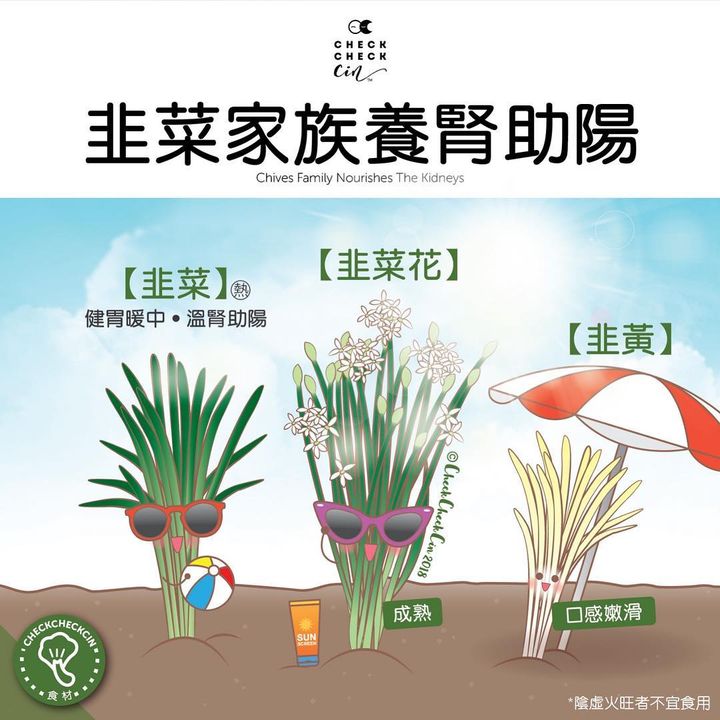November 21, 2018
【食材百科】韭菜、韭菜花、韭黃傻傻分不清?
#韭菜四季都有以春天最鮮嫰
#怕冷人士不妨多吃
#星期四食材
韭菜家族養腎助陽
韭菜帶有特殊香味,情況同芫茜差不多,讓人對它愛恨分明,別看輕這棵經常在米線中出現的配菜,它別號長生韭、起陽菜、壯陽菜,是少數性熱的蔬菜,具健胃暖中的功效之餘,更有溫腎助陽作用。韭菜、韭菜花和韭黃常常讓人混淆,其實都是同一種植物,功效相約,只是收割時間和處理手法不同,帶來不同味道和口感。
韭菜 — 性熱,味甘辛,具健胃暖中、溫腎助陽、散瘀活血功效,適合偏寒體質、陽虛怕冷、腰膝酸軟、男士陽事衰弱、尿頻人士;女士陽氣不足以致行經小腹冷痛食用。由於性熱,陰虛火旺者不宜食用。
韭菜花 — 韭菜生長到後期會開始長花,此時韭菜變得太過成熟口感變差,一般只收採開花的前端部份作食用。
韭黃 — 當韭菜生長時,刻意遮光阻礙韭菜吸收陽光,在不能產生光合作用之下不含葉綠素,不會變成綠色,就會成為韭黃,口感比韭菜嫩滑。
Chives family can nourish the kidneys
Chives have a distinct odour that makes people either love it or hate it. It is one of the few vegetables that are warm in nature, and can help to warm the stomach as well as the kidneys. People often confuse between chives, chives flower and yellow chives. They have similar healing effects but harvesting and processing methods may differ leading to different flavour and texture.
Chives- hot in nature, can warm the stomach, warm the kidneys and nourish yang, relieve bruising and promote blood circulation. Suitable for those with cold body types, yang deficiency, aversion to cold, weak and sore lower back and knees, men with frequent urination, insufficient yang qi that leads to abdominal pain. Due to its hot nature, those with asthenic yin should avoid.
Chives flower- chives start to grow flowers towards the end and the plant may be over ripe. Usually only the front tip of the floral ends is harvested for consumption.
Yellow chives- during the growth of chives if you block sunlight, then the chives become yellow and it also has a soft and smoother texture.



